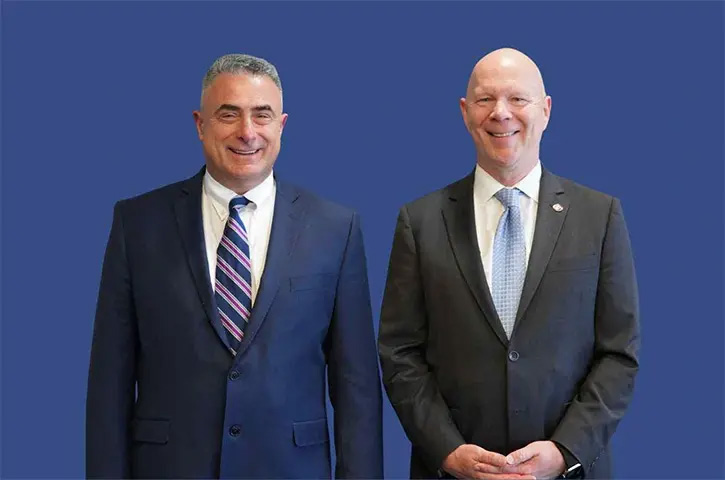
Issue Spotting Under the Federal Tort Claims Act
Law paves way for claims against government workers
By MICHAEL GIORDANO and PAUL McCONNELL
Every year in Connecticut, scores of federal claims arise on account of the tortious acts of federal employees. Tens of thousands of people receive medical care at U.S. Department of Veterans Affairs hospitals and increasingly at federally funded community health care clinics. Nearly every day on every road postal trucks scurry to deliver our mail. There are federal buildings and facilities in nearly every town.
The Federal Tort Claims Act is the exclusive money damages remedy for negligent acts or omissions of federal government employees acting within the scope of their federal employment. For the uninitiated, the FTCA may appear to be a dangerously slick statutory framework that invites casualty; however, if you are aware of the pitfalls and take caution, you will be well positioned to serve your clients well. This article is designed to provide a brief overview of the statutory framework for bringing a federal claim and to alert practitioners to common pitfalls.
To bring a claim under the FTCA, the tortfeasor must be a federal employee acting within the course and scope of his or her federal employment. Federal law determines whether a given individual is an employee of the U.S. The test to determine if an individual is a federal employee is whether the government has the “right to control the details of the day-to-day performance of duty” of the employee, as in United States v. Orleans, 425 U.S. 807 (1976). State tort law determines whether a given employee was acting within the course and scope of his or her federal employment, as in Williams v. United States, 350 U.S. 857 (1955).
There are limits and restrictions associated with claims and claimants under the FTCA. In short, with some exceptions, intentional torts such as assault and false arrest are barred. Similarly, the FTCA does not waive sovereign immunity as to strict liability claims. Admiralty claims are covered by the Suits in Admiralty Act, 46 U.S.C. §30901, et seq. Moreover, government policy decisions cannot be subject to a tort suit. There are also exceptions to the general rules stated above that permit action under the FTCA. For example, when an intentional tort such as assault and battery is committed by federal law enforcement officers, sovereign immunity is waived, per 28 U.S.C. §2680(h). Thus, the analysis starts with—but does not end with—determining whether the tortfeasor was a federal employee acting within the scope of his or her employee.
Most of you are familiar with or have heard of the Feres doctrine, which is a judicially imposed bar to FTCA recovery for certain claimants in some circumstances, stemming from Feres v. United States, 340 U.S. 135 (1950). In sum, the Feres doctrine prohibits servicemembers who are injured “incident to service” from maintaining an FTCA action. That said, there are numerous exceptions to the general rule and several ways to find relief for a client’s family who might otherwise appear to be precluded from recovering damages. For example, the Feres doctrine does not bar a veteran’s claim for medical malpractice that occurred after discharge even though the original injury was sustained while he was on active duty, as in United States v. Brown, 348 U.S. 110 (1954). Also, dependents are typically not barred from recovery even if they enjoy health care benefits on account of their status.
Statute of Limitations
An FTCA claim generally accrues at the time of the plaintiff’s injury, as in United States v. Kubrick, 444 U.S. 111, 120 (1979). Title 28 U.S.C. §2401(b) provides: “A tort claim against the United States shall be forever barred unless it is presented in writing to the appropriate federal agency within two years after such claim accrues or unless action is begun within six months after the date of mailing, by certified or registered mail, of notice of final denial of the claim by the agency to which it was presented.” Even though the FTCA bars a claim unless “an action is begun within six months” of a denial of the claim, courts have required that the U.S., as defendant, be served within the six-month statute-of-limitations period. Service of process is governed by Federal Rule of Civil Procedure 4(i)(1), which directs service of a copy of the summons and of the complaint on both the attorney general and U.S. attorney for the district in which the action is brought. After presenting the administrative claim, the claimant cannot file suit until the agency has had the claim for six months. After the agency has had the claim for six months and has not settled or denied it, the claimant may deem the claim denied and file suit in federal court. If the agency notifies the claimant by certified or registered mail of its decision to deny the claim, the claimant must file suit or request reconsideration within six months of the date of mailing of the letter or the action will be forever barred, per 28 U.S.C. §2401(b) and 28 C.F.R. §14.9(b).
Bringing a Claim
The administrative remedies set forth in the FTCA scheme must be exhausted prior to filing suit. Exhaustion of FTCA administrative remedies is a jurisdictional requirement. A federal court complaint will be dismissed for lack of subject-matter jurisdiction if the claimant has failed to exhaust his administrative remedies, as in McNeil v. United States, 508 U.S. 106, 112 (1993). Written notice of the administrative tort claim must be presented to the appropriate government agency, per 28 U.S.C. §2675(a). The standard method of providing notice is by submitting the government’s Standard Form 95, or SF-95. The claimant does not have to state a cause of action in the administrative tort claim; however, a claimant’s suit may be brought only on those facts and theories of liability raised in the administrative claim. There is ample case law on this topic that goes beyond the scope of this article; however, the point is that counsel should err on the side of inclusion when considering which theories of liability to allege during the administrative process.
Another common SF-95 mistake that has occurred recently in Connecticut is the failure to allege and demand a “sum certain.” In Connecticut state court, a civil complaint typically alleges a sum “in excess of $15,000” and counsel are not limited on the damages they may thereafter seek to recover. This type of demand is not acceptable under federal law. Under federal law, a tort claim must demand a sum certain in money damages and failure to have specified a sum certain at the administrative stage is a major defect. The amount of recovery cannot exceed the amount claimed in the SF-95 unless “the increased amount is based upon newly discovered evidence not reasonably discoverable at the time of presenting the claim, or upon allegation and proof of intervening facts, relating to the amount of the claim,” per 28 U.S.C. §2675(b).
The written notice (SF-95) of the administrative tort claim must be presented to the appropriate government agency, per 28 U.S.C. §2675(a). Presentment is the date the agency “receives” a written administrative tort claim. The “appropriate federal agency” is not defined, but generally means the agency whose employees’ acts or omissions caused the injuries that are the subject of the claim. Typically, this is not too hard to figure out, but there are cases dealing with constructive presentment as it relates to tolling the statute of limitations. In sum, be sure to take care to ensure that you send your administrative demand to the correct agency.
Choice-of-Law Challenges
The FTCA provides that the law of the state where the act or omission occurred determines the liability of the U.S., per 28 U.S.C. §1346(b). Importantly, the law of the state is the “whole law,” including the state’s choice-of-law rules, as in Richards v. United States, 369 U.S. 1 (1962). Thus, complications arise when it is unclear in which jurisdiction the negligent or wrongful acts occurred. Choiceof-law conflicts are also created by the fact that venue may be found either in the district where the negligent act occurred or within the district where the plaintiff resides. This topic area goes beyond the scope of this article, but practitioners should be aware that when resolving choice-of-law conflicts, courts are frequently willing to be creative to the benefit of your client, provided you show them how and why. There are several good law review articles that discuss in detail the choice-of-law issues in the context of the FTCA.
Damages and Attorney Fees
Most likely, if your case proceeds to trial, it will be a nonjury trial before a U.S. district court judge. That said, when there are multiple defendants and at least one of them is a nonfederal employee, then you may litigate the case before a jury in federal court wherein the jury and judge will each be called on to resolve their piece of the liability/damages allegations. This is increasingly likely as federally funded community health care clinics become more common.
Relief under the FTCA is limited to money damages; equitable relief is not authorized. As stated, the amount of recovery cannot exceed the amount claimed in the administrative claim. State damage caps also apply pursuant to the state law that the federal court chooses to apply. Punitive damages are prohibited and prejudgment interest damages are similarly barred, per 28 U.S.C. §2674. Attorney fees are limited to 20 percent of an administrative settlement or 25 percent of a judgment or compromise settlement after suit is filed. It is a federal crime to charge, demand, receive or collect more than the specified amounts.
Another issue to be aware of that does not relate to the state’s damages law relates to TRICARE (i.e., military health insurance benefit) and Medicaid/ Medicare offset issues. By statute, the government is entitled to an offset for medical care expenses covered by TRICARE. However, in the past, the issue as to “future offset” was a procedural and evidentiary one. Currently, in an FTCA case, the issue of whether the government is entitled to an offset, including one based on alleged TRICARE coverage, is an affirmative defense on which the government bears the burden of proof. A majority of federal courts have looked to the source or origin of the funds provided to determine whether they are collateral sources that should not be subject to offset. Using this analysis, most courts have ruled that TRICARE benefits or their equivalent are not collateral sources to the federal government, so they are subject to offset, as in Mays v. United States, 806 F.2d 976, 977 (10th Cir. 1986). The plaintiff therefore must make the government’s claim for future offset about the burden of proof. The government must prove with reasonable certainty not only what specific medical care and treatment will be covered, but also the specific amount of future medical care and treatment reduced to present value; otherwise, it has not met its burden, as in Siverson v. United States, 710 F.2d 557, 560 (9th Cir. 1983). In sum, focus on the burden and argue that specificity is required.
Lastly, don’t be afraid to go to trial in a judge-alone case. A federal judge is perfectly capable of discerning the truth and providing just relief on a well-presented case that is supported by facts. If you act with due care, you will avoid some of the pitfalls inherent in federal tort claims and be well positioned to provide your client the result they deserve.






